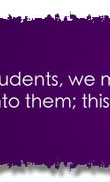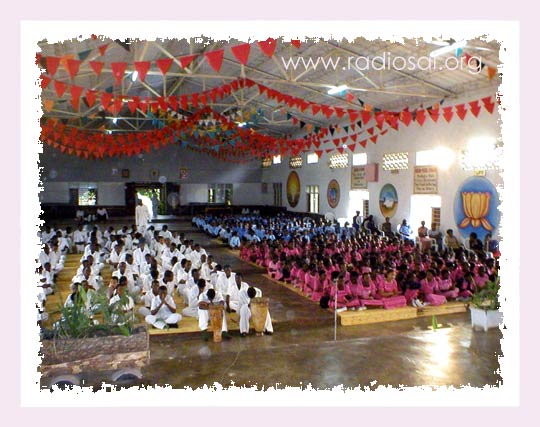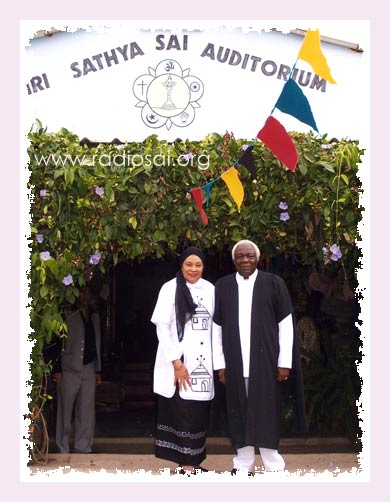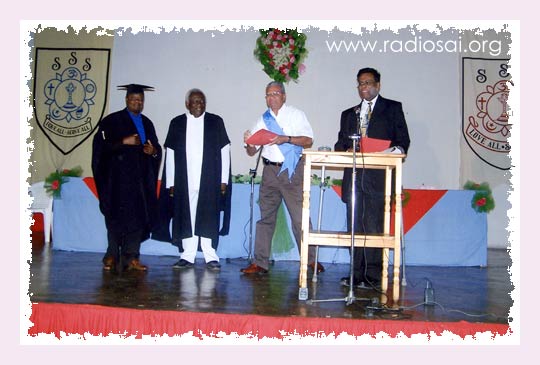Home >> Cover Story |
| Follow us: |
Posted on : Oct 8, 2011
BABA'S FANTASTIC FLUTE
- A tribute to the elevating life of late Dr. Victor 'Krishna' Kanu
Part 5
The Secret Behind the 'Miracle School'
The Sathya Sai School of Zambia operates within the statutory framework of the Ministry of Education of the Republic of Zambia. It prepares boys for the well-conceived and proven Zambian General Certificate of Education/School Certificate. Apart from 14 classrooms in the Primary School section and 10 in the Secondary School section, the school complex consists of an Administration Building which houses the offices of the Principal, Vice Principal, Director of Studies and Secretariat. Additionally there is a separate auditorium with a seating capacity for 2000 pupils.
As mentioned earlier the excellent results of the school have come from boys who had been earlier classified as 'drop outs'. It is perhaps the only institution in the world which lovingly accepts 'failures'! But how does this amazing transformation in the calibre and character of its students happen?
 |
 |
 |
 |
 |
 |
 |
 |
|
The special auditorium attached to the school has a seating capacity for 2000 pupils and is used mainly for assemblies, cultural programmes, celebration of major festivals of world religions and dramas |
|||||||
“It is because of the Human Values Program,” Victor asserts. “They (the authorities) saw the practical application of Truth, Love, Peace, Righteousness and Non-Violence by us – the teachers, my wife and I. We groomed the students, we made them become exemplars of love. We made them feel that they were our children. We just poured love, love and more love into them; this was something they had never experienced at home.”
 |
 |
 |
 |
 |
 |
 |
 |
How exactly did Victor and his team 'pour love' into the children?
“By sharing what we had and spending long hours with them; by caring for them; by sacrificing ourselves and our lives for their sake, and by working very long hours to help them and make them believe that they were not failures but achievers. By sharing, caring and forgiving them when they made mistakes. By correcting them without hurting them like Swami does with all of us - He guides us without causing us pain.
“And when we put all these values into practice, the students responded! They worked hard and made it. That’s how year after year we started generating 100% success stories with children from grade 9 to 12. Soon the school came to be known as the ‘Miracle School'. It was a miracle because what was impossible in Zambia became possible.”
 |
|
| The Sathya Sai School of Zambia is the first Sai School to be opened outside India |
The secret of the Miracle School was simple – unleash the power of human values by practising them passionately. But we all know that this is easier said than done. Could human values be really integrated into subjects such as biology, math and English? If yes, then how?
Victor explained: “Bhagawan tells us: 'Elicit the values'. He says that values are not only within us but also in everything including the very subjects that we teach. So we are not trying to contrive or create values where there are none. For example, in the school curriculum we treat each subject and topic in an academic way so that it is understood correctly for the purpose of the examination. But we also see to it that the values inherent in them are drawn out and explained so that the children can apply them in their lives.
“For instance, in the very English language that we are using to communicate now, there are twenty-six alphabets – A to Z; each alphabet can of course stand on its own, but for each of them to be more meaningful it has to be associated with the other alphabets. This is how words are formed leading on to purposeful sentences, paragraphs and so on. So what we see here is togetherness, co-operation and unity – all of these can be brought out in a lesson.
“Let me give you another example. Take osmosis – the process by which plants intake their food; this is such a beautiful subject. It is very difficult to find a root that is straight; they are always twisted. Why? Because in their search for water, they come across obstacles – rocks, clay, sand or whatever – but they don’t stop; they never give up! They find alternative ways; they are always in search of water even while they are performing their duties. And when they do find water, they don’t keep it to themselves; they share it. So even as the children learn about the scientific explanation and observe all this in a laboratory, there are so many other lessons to be taught here.
“Therefore in this way, the human values program brings into the classroom what perhaps would have been taught outside.”
Authorities Applaud, Society Supports and Parents are Impressed
This novel approach to education based on Baba's teachings was what produced miracles in the Sathya Sai School of Zambia. But did everyone accept this philosophy? Wasn't there resistance from any quarter in this predominately Christian nation where there exists a wide variety of religious traditions including a host of deep-rooted beliefs? How did Victor tackle these issues?
“Well, we were guided by Swami. He always says that education should be anchored to the culture of the nation where it is being introduced; we just followed this advice. By culture, we mean the beliefs and practices of people through time, and tradition refers to the manner in which these beliefs and practices have been transmitted from state to state.
“So what are the beliefs in Zambia? In terms of religion, it’s Christianity. Are there values in Christianity? Of course, yes. We carried out a research in the school wherein we combed the Bible and extracted all or most of the relevant verses pertaining to Truth, Love, Peace, Righteousness and Non-violence; in fact the whole Bible is about these values.
“We also looked at the Koran. Prophet Mohammad has said: '50% of religion is Righteousness'. The Koran is all about such values. We have these documents in the school – the Bible and the Koran – and the Human Values. And the two say more or less the same thing! The local society accepted it because we also looked at the African culture.”
The children of the Sathya Sai School of Zambia, therefore, had a solid grounding of their value systems and the local society understood its importance and appreciated this initiative. Besides these groups, there was another segment that benefitted tremendously from this unique experiment of value education - parents.
Victor witnessed any number of such real life transformations as outcomes of the value education imparted at the school. One of the most encouraging signs for this institution is that on Parents' Open days at the school the participation and cooperation of the parents is 100%. Not surprisingly, within just a few years of its operation, the school that was scouting for children to impart secondary school education is today flooded with applications. It is not only the poor who come to this school now, there is a competition to get seats even from the very well-heeled.
 |
 |
 |
 |
 |
 |
 |
 |
On this shifting scenario, Victor said: “Well, when we opened the school, we had difficulty in finding people but today there are more children coming from middle class families living in the town than the local poor kids. When we started, there was only one Mercedes car that used to bring a Muslim boy. But today there are many cars. There are cruisers; in other words, even the rich bring their children to this school. It is now recognized nationally as one of the best in the country.”
Now among the children of the school there are sons of Chief Inspectors of Police, Ministers, Mayor, Inspectors of Schools, Members of Parliament, police and army officers, and other professionals. However no preferential treatment is given to any of them.
Boys from Grade 1 to 11 clean their own classrooms, the environment, the teachers' rooms, the auditorium, and also willingly the toilets, even though there are cleaners to do this. And they do all of this happily and together as they sing bhajans and devotional songs.
A few years ago a large ministerial delegation from the office of the Vice President of the country including the Deputy Minister of Educational Development came on an inspection of the school in order to assess the SSEHV value-oriented programme. They marvelled that there was 'no graffiti, no rubbish, not a single broken window, and the fifty-one pupils' flush toilets were so spotlessly clean!' 'How boys who earlier indulged in vandalism in other schools have now changed into such angels!' they wondered. Infact they were so impressed that they wrote in their official report: 'We recommend the building of Sathya Sai Schools all over the country.'
 |
 |
 |
 |
 |
 |
 |
 |
One interesting outcome of all this is that the government sometime ago granted 20 acres of land for the construction of a Sri Sathya Sai Girls' School. And Victor did start this separate school in the neighbourhood which is now functioning as admirably as the boys' school.
 |
 |
 |
 |
 |
 |
 |
 |
| Dr. Kanu also started a girls school on a 20 acre land granted by the Government of Zambia | |||||||
Sai's Ceaseless Concern for the Zambia School
It was definitely a long, challenging yet fulfilling journey for Victor and his team to achieve this mission. And if he was able to achieve this, it was because as they say 'the Force was with him'. Baba was always guiding him physically whenever Victor visited Puttaparthi and also otherwise. The instances where Victor felt Baba's omnipresence and invisible loving care are numerous.
He narrated one such in a talk he gave to the students of Baba's university in Prasanthi Nilayam in 2002. “Let me tell you one incident that happened last year (2001); this is an extremely important one. We had moved down to having pre-university classes, what we call ‘A’ Level classes - Advanced level classes - at the Sathya Sai School. I wanted to distinguish these boys from all the rest by giving them some academic uniforms. I telephoned our friend in the United States and asked him if he could find us some gowns that undergraduates in the West normally would wear. We had a long discussion and he asked me about the colours. I said: 'Let it be black'. That ended the conversation and I went to bed.
“That night Swami came in my dream and said, 'What is the colour of the gowns?' I said, 'Swami, black.' 'No, no, not black; have it blue.' He even had a piece of cloth which He showed me and again reiterated that it should be blue and not black. Here I was in Ndola in Zambia having a telephone conversation with a person in the US and Bhagawan was correcting me! Baba is God; He is present in everything, in all the elements.”
 |
 |
 |
 |
 |
 |
 |
 |
Understandably, Baba was always proud of Victor and his work in Zambia. And, whenever Victor visited Prasanthi Nilayam, Baba would invariably talk to him and shower him with His blessings. On one occasion, when Victor had brought some of the children of the school to Puttaparthi, Baba was so delighted that He asked the university students sitting nearby, “Do you know where those students come from?” And then pointing to Victor, Baba said, “What Victor is doing is truly very great; he is guiding the youngsters and giving them a goal. This is one of the greatest services you can do to mankind.”
African Institute of Sathya Sai Education Comes Into Being
 |
|
| With his wife Geneveive: co-travellers in their journey of love and service |
The Lord inspired Victor, guided Him and finally applauded him. On his part, Victor has no other mission in his life than working towards spreading the love and message of Baba. To ensure that the quality of education offered at the Sathya Sai School is maintained and augmented with time, and also to further the cause of value education in Africa, during an All Africa Sai Conference held in Durban in 1999 it was decided to start the African Institute of Sathya Sai Education.
The mission of this body was to train teachers in value education as well as undertake research and develop the EHV program further. This institute was to parent the school. And this is exactly what it has been doing from 2000 when it was set up. At the end of the course, diplomas are awarded to teachers who come from government schools. And Victor was the man behind the genesis and the blossoming of this wonderful institute.
Talking about the great strides that Victor took in furthering Baba's mission, Kalyan Ray, chairman of the Education Committee of Sri Sathya Sai World Foundation says, “His deep conviction that human values are the key to making a new man and a new society, and his extraordinary persuasive skills convinced the United Nations to start in 2001 a Human Values based education programme for resource conservation in Africa. Victor, his wife Genevieve and the trainers of the African Institute of Sathya Sai Education, worked tirelessly for nearly a decade to introduce human values in public school curriculum in 14 African countries through the UN programme. Ten years on, the programme that Victor started has spread beyond the shores of Africa to Asia and Latin America.”
UN-HABITAT Appoints Kanu as its Consultant
It all started with an expert group meeting in April 2001 in Johannesburg to which many intellectuals from all over Africa were invited. They were to discuss the problem of water in that continent. This had become a major issue because of many reasons. Firstly, a century ago the population of Africa was only about 150 million whereas in 2001 it was 875 million. According to an estimate, in about 25 years, this figure is likely to swell to 1.5 billion people. And all these billion and half population in the African continent would be using the same water resources available from the rivers or lakes, as did people 100 ago. Therefore the conservation and optimal distribution of water had become paramount. Secondly, there was the problem of water pollution and misuse.
 |
 |
 |
 |
 |
 |
 |
 |
In the conference at Johannesburg, many papers were presented and among them was Victor's on the theme “Water Education - A Human Values Approach”. This was received so well that all the members present there unanimously adopted his idea as a possible solution that would complement existing methods employed by the UN. Following this, he was asked to present a similar paper to the special session of the United Nations General Assembly in New York on June 6, 2001. This presentation too was much appreciated. Subsequently, Victor was asked to chair a sub-regional meeting of African countries in Ndola, Zambia, and another in West Africa. Soon after this, he was appointed by UN-HABITAT (The United Nation's Centre for Human Settlement) as a consultant for integrating human values in water education in the curriculum of schools in Africa starting with six countries - Ethiopia, Kenya, Zambia, Ghana, Senegal and Ivory Coast.
His task basically was to revamp the existing syllabi and blend them with water education based on Baba's human values. And this was to be done all the way from pre-school to primary and secondary school.
SSEHV on the March Lead by Victor
 |
|
| Dr. Kanu presiding over a function in the Sai School |
Victor went about this work diligently because there was no one more convinced than him that if Africa was to be healed from the many ills that were paralysing the development of the continent right from pollution to corruption, it could happen not with large aids and grandiose restructuring plans of the UN but by touching the minds and hearts of people and transforming their attitudes. And this was possible only by instilling in them human values as taught by Baba. Victor strived towards this goal relentlessly.
“He would always be the first to remind us that Sathya Sai Education was all about transformation and not of more information,” says Kalyan Ray and continues, “To those of us in the International Education Committee, Victor had effortlessly slipped into the role of our conscience keeper! He was ever alert to see that the vagaries of our minds do not ensnare us too much with ‘modern’ educational theories and techniques, lest we stray away from the narrow and straight path of Sathya Sai Education, which Swami had bestowed on us through his pristine spiritual teachings. The signal contribution of our dear brother Victor in the development of the comprehensive educational guidelines for Sai schools and institutes would never be forgotten. Victor again led the way in implementing the guidelines by travelling extensively throughout Africa, ever forgetful of his failing health and advanced age.”
 |
 |
 |
 |
 |
 |
 |
 |
Kishin Kubhchandani adds, “With the blessing and guidance of Baba, apart from the school in Zambia, Victor established Sathya Sai Education in Human Value institutes in Zambia and Kenya, and was about to set up one in Nigeria.”






